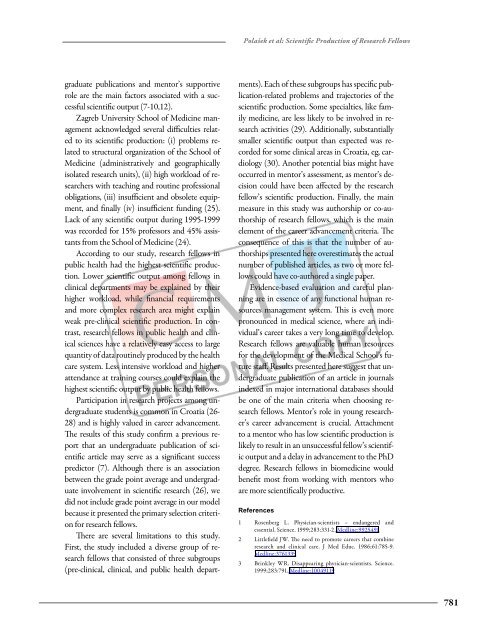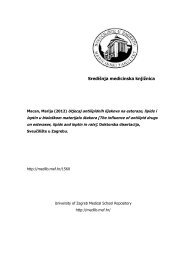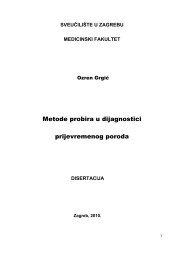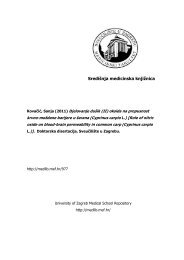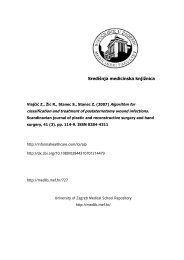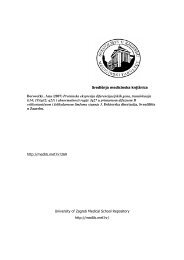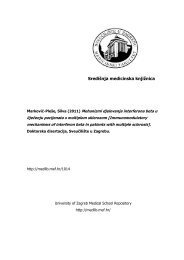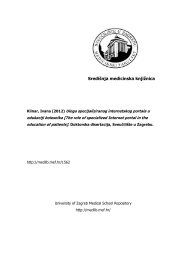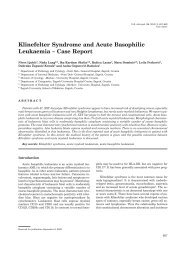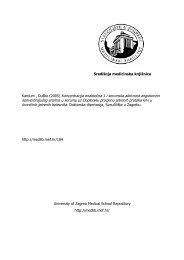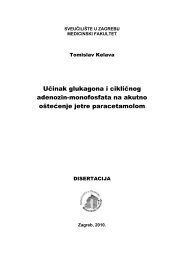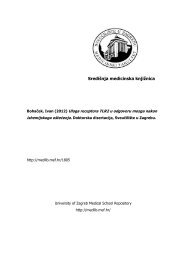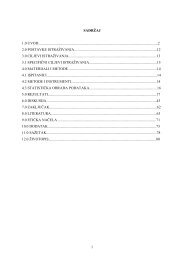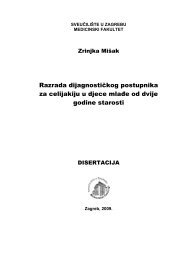pdf (519 KB), English, Pages 730
pdf (519 KB), English, Pages 730
pdf (519 KB), English, Pages 730
Create successful ePaper yourself
Turn your PDF publications into a flip-book with our unique Google optimized e-Paper software.
graduate publications and mentor’s supportive<br />
role are the main factors associated with a successful<br />
scientific output (7-10,12).<br />
Zagreb University School of Medicine management<br />
acknowledged several difficulties related<br />
to its scientific production: (i) problems related<br />
to structural organization of the School of<br />
Medicine (administratively and geographically<br />
isolated research units), (ii) high workload of researchers<br />
with teaching and routine professional<br />
obligations, (iii) insufficient and obsolete equipment,<br />
and finally (iv) insufficient funding (25).<br />
Lack of any scientific output during 1995-1999<br />
was recorded for 15% professors and 45% assistants<br />
from the School of Medicine (24).<br />
According to our study, research fellows in<br />
public health had the highest scientific production.<br />
Lower scientific output among fellows in<br />
clinical departments may be explained by their<br />
higher workload, while financial requirements<br />
and more complex research area might explain<br />
weak pre-clinical scientific production. In contrast,<br />
research fellows in public health and clinical<br />
sciences have a relatively easy access to large<br />
quantity of data routinely produced by the health<br />
care system. Less intensive workload and higher<br />
attendance at training courses could explain the<br />
highest scientific output by public health fellows.<br />
Participation in research projects among undergraduate<br />
students is common in Croatia (26-<br />
28) and is highly valued in career advancement.<br />
The results of this study confirm a previous report<br />
that an undergraduate publication of scientific<br />
article may serve as a significant success<br />
predictor (7). Although there is an association<br />
between the grade point average and undergraduate<br />
involvement in scientific research (26), we<br />
did not include grade point average in our model<br />
because it presented the primary selection criterion<br />
for research fellows.<br />
There are several limitations to this study.<br />
First, the study included a diverse group of research<br />
fellows that consisted of three subgroups<br />
(pre-clinical, clinical, and public health depart-<br />
Polašek et al: Scientific Production of Research Fellows<br />
ments). Each of these subgroups has specific publication-related<br />
problems and trajectories of the<br />
scientific production. Some specialties, like family<br />
medicine, are less likely to be involved in research<br />
activities (29). Additionally, substantially<br />
smaller scientific output than expected was recorded<br />
for some clinical areas in Croatia, eg, cardiology<br />
(30). Another potential bias might have<br />
occurred in mentor’s assessment, as mentor’s decision<br />
could have been affected by the research<br />
fellow’s scientific production. Finally, the main<br />
measure in this study was authorship or co-authorship<br />
of research fellows, which is the main<br />
element of the career advancement criteria. The<br />
consequence of this is that the number of authorships<br />
presented here overestimates the actual<br />
number of published articles, as two or more fellows<br />
could have co-authored a single paper.<br />
Evidence-based evaluation and careful planning<br />
are in essence of any functional human resources<br />
management system. This is even more<br />
pronounced in medical science, where an individual’s<br />
career takes a very long time to develop.<br />
Research fellows are valuable human resources<br />
for the development of the Medical School’s future<br />
staff. Results presented here suggest that undergraduate<br />
publication of an article in journals<br />
indexed in major international databases should<br />
be one of the main criteria when choosing research<br />
fellows. Mentor’s role in young researcher’s<br />
career advancement is crucial. Attachment<br />
to a mentor who has low scientific production is<br />
likely to result in an unsuccessful fellow’s scientific<br />
output and a delay in advancement to the PhD<br />
degree. Research fellows in biomedicine would<br />
benefit most from working with mentors who<br />
are more scientifically productive.<br />
References<br />
1 Rosenberg L. Physician-scientists – endangered and<br />
essential. Science. 1999;283:331-2. Medline:9925491<br />
2 Littlefield JW. The need to promote careers that combine<br />
research and clinical care. J Med Educ. 1986;61:785-9.<br />
Medline:3761339<br />
3 Brinkley WR. Disappearing physician-scientists. Science.<br />
1999;283:791. Medline:10049119<br />
781


